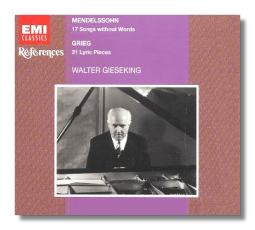
The Internet's Premier Classical Music Source
Related Links
- Latest Reviews
- More Reviews
-
By Composer
-
Collections
DVD & Blu-ray
Books
Concert Reviews
Articles/Interviews
Software
Audio
Search Amazon
Recommended Links
Site News
 CD Review
CD Review
Gieseking Plays

- Felix Mendelssohn: Songs Without Words (17 excerpts from Opp. 19, 30, 38, 53, 62, 67, 85, and 102)
- Edvard Grieg:
- Lyric Pieces (31 excerpts from Opp. 12, 38, 43, 47, 54, 57, 62, 65, 68, and 71)
- Pictures from life in the country: The bridal procession passes
Walter Gieseking, piano
EMI Classics 66775 ADD monaural 2CDs: 77:28, 72:03
Most of these recordings were made in 1956, not long before the pianist's death. Although some of this material previously has appeared on CD, the present reissue is much more desirable than its predecessors. As an authorized release, it does Gieseking's reputation the best service, thanks to Bryce Morrison's annotations and expert audio restoration carried out at Abbey Road Studios (the original recording site) by Andrew Walter. Gieseking's EMI recordings were compromised by dead sound. Somehow, this remastering has opened them up a little. They're still not an audiophile's delight, but this is an improvement over the records and the previous CD releases.
Gieseking achieved a paradox with these recordings: he devoted so much care to them that they seem absolutely artless. The pianist who mastered Beethoven's epic edifices also had the modesty to efface himself in front of Mendelssohn's and Grieg's innocent creations. Not once does he say, "Look at me!" or "Now I'm going to show you how beautiful this is." He simply plays the music without condescension or apology. However, this is not to say that his interpretations are simple! Listen to Grieg's "Puck" (Op. 71, #3) and you'll hear at least two layers of musical thought running at the same time. On the surface, Gieseking is depicting the jolly mischief of Shakespeare's spirit, but on a lower level, Gieseking finds the darker colors that hint at the possibility, not necessarily realized, of a more maleficent disposition. And perhaps Mendelssohn's miniatures are less emotionally complex than Grieg's, but even here, Gieseking goes beyond their pretty surface and exposes their true Romanticism.
Gieseking also recorded Grieg's "Butterfly," "Lonely Wanderer," "Little bird," "To the Spring," and "Wedding Day at Troldhaugen" in 1948, and this set includes those earlier versions for the purpose of comparison. Without exception, they are quicker, and they call more attention to Gieseking's excellent technique. Nevertheless, they too are insightful readings.
This is another release in EMI's References series, which continues to make vintage mono-era recordings available to today's collectors.
Copyright © 1999, Raymond Tuttle


















